Rodrigo Montenegro, co-founder and CEO of Gamma Wave Technologies

Rodrigo Montenegro is a co-founder and CEO of Gamma Wave Technologies. Rodrigo holds post-graduation diplomas in both Neuropsychology (PgCert.), Neuromodulation medicine (PgCert.) and MSc. in Neuroscience.
Gamma Wave Technologies Ltd. is a start-up founded in July 2019 by an expert team in neuroscience and biomedical engineering, highly recognised in their fields, to apply neuroscience insight in the field of sleep. Our aim has been to develop an advanced, consumer-grade, neurofeedback electroencephalographic (EEG) wearable (headband) with applications to enhance sleep providing users with market innovative technical solutions.
Gamma Wave Technologies Ltd. has developed a clinical-grade consumer headband (7th prototype – TLR3 ready) that incorporates neurofeedback technologies and software applications. We are currently looking for seed-stage capital to take our prototype to its next stage.
What is your background? What made you decide to become an entrepreneur?
Rodrigo was previously the CEO and Founder of Cashhelper Ltd., one of the 1st social crowdfunding cashback platform in the UK based on John Nash’s Nobel prize of economics theory of equilibrium. Rodrigo is a book author and has lectured internationally on the subject of non-ordinary states of sleep at the Mind Body and Soul (BMS) and the 5th Breaking Convention (University of Greenwich) among others, since 2005. Featured in acclaimed documentaries, he has worked in the field with institutions such as the Scientific and Medical Network (SMN) exploring and expanding the frontiers of consciousness sleep research.

Entrepreneurship is about the dynamic intertwining of vision and growth mindset. Vision leads one to understand that the goals are greater than ourselves and, although we may have the potential to see what others have overlooked, our goals can only be achieved understanding the interdependence each member of the team has to each other to be successful. Achieving that shared vision cannot be done without a growth mindset. Setting the pace for a team that aims more to grow by overcoming challenges rather than to win at any costs. By empowering the team to will to embrace difficulties as natural steps towards greater achievements, to accept challenges as the need to achieve that vision, and understand that the potential rewards are greater than the possible sacrifices along the way.
How and when did you know your idea was good enough to develop it?
In July 2019, when the company was founded. The co-founders were previously looking at headsets with open-sourced systems that could be used to develop new software. Along that journey, it became clear that none of the current headsets had the technical design or the ability to record high-quality data at the desired level to achieve our objectives. This set us on the journey with the thinking that we could bring our expertise together to develop something with technologies and software applications that were not envisioned at the time with the potential ability to revolutionise the market.
What would you say are the top 3 skills that needed to be a successful entrepreneur? Why?
There is a combination of factors measuring and skills that can define successful entrepreneurs such as their ability to aggregate funding, endowment, research excellence and/or influence, specialisation expertise, resilience, etc. Of those I believe these three are fundamental:
1. Resilience: great entrepreneurs show intelligence and are selective with what they spend their time with, inherently understanding they are limitations to their capacity of changing things, explicitly engaging with what they can pragmatically change, here and now, although never losing sight of the high standards and objectives they set themselves to achieve in the long run (Pareto’s Law). This lead one’s ability to drive change and thrive on failure through hard work.
2. Intelligence: Steve Jobs considered intelligence as paramount to entrepreneurship. A condition he saw as the ability to make unexpected connections between fields, which can be further defined as the capacity to remain inventive to respond to unanswered challenges while still being able to be consistent and scientific-based on your experience and knowledge of the field. This defines one’s ability to refine and generate ideas, make important questions, and spot opportunities.
3. Growth-mindset: setting up a growth mindset entrepreneurial culture is often considered as an essential foundation of a successful lean start-up. Such type of cultures are driven by positive and open communication, interpersonal skills open to take feedback, lack of apprehension for changes, and increased personal acceptance of responsibilities motivated by the firm belief in the potential for achievement of every member.
What is your favourite part of being an entrepreneur?
I believe it to remember why you started it while seeing that you are fulfilling your mission statement and vision, being part of the change you want to see.
What individual, company or organization inspires you most? Why?
Steve Jobs, with Apple, can arguably be considered as one of the most prolific and recognised inventors having profoundly influenced the lives of millions with his innovations. Although his leadership style was often put into question, there is no doubt that the level of his success, and the reason why he inspires us at Gamma Wave Technologies Ltd., is not only related to his inauspicious origins and the inconspicuous beginnings of his company developing computers in a garage, specifically so with the Apple I – a personal computer few understood the value of -, but equally because of the way Jobs revolutionized how we did things, because his genius, as a co-inventor of such innovations solved problems in new ways, which in the end became indispensable to millions (e.g. personal computer; iPod, the iPhone). Gamma Wave Technologies Ltd. aims at doing the same with how we sleep.
If you had 5 minutes with the above individual/ company/organization, what would you want to ask or discuss?
We would want him to test our product and with his expertise in product development, technology and business provide extensive critical feedback of our features and how we could improve it.
What has been your most satisfying or successful moment in business?
Achieving a TLR3 ready prototype.
What would you say have been some of your mistakes, failures or lessons learned as an entrepreneur?
As a CEO, the most important lesson from my previous start-up was to void to narrow my mindset to a fixed one, trying to achieve product perfection that was statically debilitating the business, instead of a lean start-up. In a lean start-up, objectives need to be implemented through a principled approach to product development, explicitly engaging the fundamental activities of the start-up as measure-learning processes, validated regularly through customer feedback—successful start-up tune into the actionable, questioning if what they are doing is relevant to that approach.
How have you funded your ideas?
Friends and family.
Are there any sector-specific awards/grants/competitions that have helped you?
Not at the present moment.
If a new entrepreneur or startup came to you looking for entrepreneurship resources, where would you send them?
To the exploration of the Enterprising Oxford site, which is full of resources.
Any last words of advice?
Enjoy the journey! Feeling satisfied with what you achieve needs to be a metric of your success.
Share this
More news



